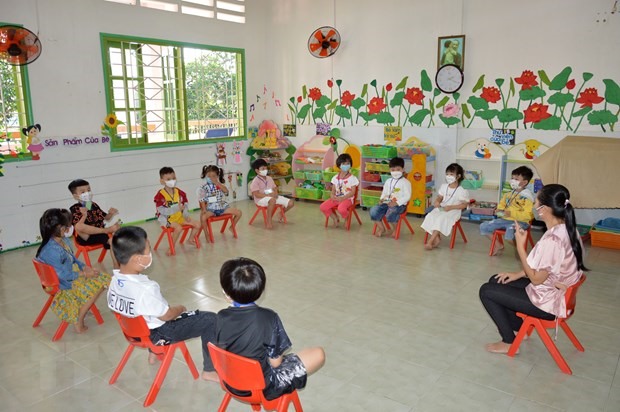.jfif) Opinion
Opinion

A quick search of social media groups catered to kindergarten owners, directors and administrators will show a constant stream of going-out-of-business sales, cries for support and anecdotal examples of the pressure the industry has been under in recent years.

|
VNA/VNS Illustrative Photo
Alex Agafonov*
A quick search of social media groups catered to kindergarten owners, directors and administrators will show a constant stream of going-out-of-business sales, cries for support and anecdotal examples of the pressure the industry has been under in recent years.
The general sense of doom and gloom has also been shared by countless families, who have exhausted their alternative childcare options in recent months. While there has been a notable uptick in optimism in the past few weeks as schools across the country have opened for most other grade levels, there remains a general confusion about the constantly changing guidance and lack of clarity on the status of kindergartens in Hà Nội.
As the founding head of school of one of the largest private kindergartens in Hà Nội, having seen our dynamic campus shuttered for 16 of the past 26 months, I am certainly a concerned member of the community. I was thrilled to see action being taken last week by one of my colleagues Đinh Phương Lan, a parent, school administrator and owner to emphasise the importance of a specific commitment to reopening private kindergartens. Her petition to the Hanoi Department of Education and Training (DOET) and city authorities received an outpouring of support from parents and administrators alike. I am happy to champion her initiative.
Reopening schools is just the beginning of what will be a road filled with many obstacles, the largest of which will be making up for a lost instructional time. The kindergarten demographic, students from 2-5 years old, are in their golden age of development, a critical time for emotional and social growth. As we quickly approach a full year of closure, the reality is that our graduates this year will enter primary school with practically no Kindergarten preparation and a very limited year of Pre-Kindergarten.
Our youngest learners have spent more time at home than at school in the last two years. There is no amount of online learning, take-home packets or time spent in their hometowns that can replace the learning experience of in-person education and the inherent “growing up” process that previously occurred at kindergartens across the country daily.
As they prepare for reopening, many families are also realising that they may face enrollment challenges as the limited amount of industry support has led to a large number of private school closures. Given the recent challenges of the education industry, there will be no rush to return to operations and those seats are unlikely to be replaced immediately. Less available enrollment spots across the city, likely mean larger class sizes, longer waitlists at the private schools that remain operational and increased strain on the already strained local public school system. Unfortunately, families will be left with much less choice during the upcoming enrollment cycle as schools now need to replace two graduating classes (2021 and 2022).
Families are also likely to notice an industry-wide increase in costs compared to a decrease in the quality of childcare services provided. Qualified teacher shortages were common pre-pandemic and the current constant threat of unemployment or underemployment makes the industry even less appealing to current college students as well as current professionals. As less qualified teachers are available in the workforce, operational expenses for schools are likely to increase and ultimately be passed down to families. It has pained me to see so many fantastic young faculty and staff leave the industry since April 2021 in search of more stable career opportunities.
I believe that the unavoidable issues outlined above are common problems shared by most schools, but are especially true for private kindergartens in Hà Nội and in other localities where reopening continues to be delayed. While campuses remain abandoned, students can be heard playing with their friends outside, spending family time with their older siblings and parents who are back to their in-person schedules and travelling across the country during holidays and weekends. As of this writing, just about every aspect of our students’ lives is back to normal, except for their ability to go to school.
There has certainly been much to celebrate in regards to Việt Nam’s COVID-19 response; low initial case counts due to timely border closures and a world-leading vaccination rate have earned applause from the World Health Organization (WHO). It is ironic to now see us violating the WHO and UNICEF recommendations stating that schools should be one of the first establishments to reopen after social distancing ends.
We seem to exist in a state of perpetual planning, analysis paralysis and confusion about what comes next. I am genuinely concerned that the immense work that went into industry-wide improvements in recent years will go to waste if it hasn’t already.
The solution for Đinh Phương Lan, myself and the overwhelming majority of other stakeholders is for private kindergartens to be given a concrete reopening date, trusting schools to handle internal COVID protocols effectively and making attendance optional for the families that are comfortable with the current situation. I hope to see students return to campus soon.
*Alex Agafonov is founder and head of Hà Nội-based GP Academy